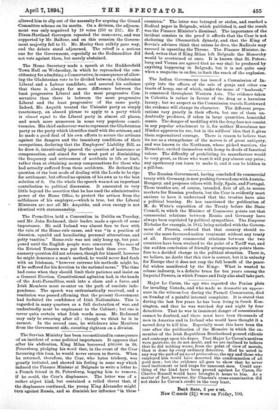The Russian Government, having concluded its commercial treaty with Germany,
is now pushing forward one with Austria- Hungary, and proposes others with Italy, Spain, and Portugal. These treaties are, of course, intended, first of all, to secure markets for Russian products, but the Czar is evidently most anxious to have it understood that the treaties have also a political bearing. He has sanctioned the publication of M. de Witte's exposition of the Treaty before the State Council, in which the Minister of Commerce points out that commercial relations between Russia and Germany have always been regulated by political sympathies. The Emperor Nicholas for example, in 1842, being satisfied with the Govern- ment of Prussia, ordered that that country should re- ceive the most-favoured-nation treatment without any treaty at all. Recently commercial relations between the two countries have been strained to the point of a Tariff war, and the sudden conclusion of friendly arrangements points there- fore to a decided change in the political situation. There is, we believe, no doubt that this view is correct, but it is unlucky for Europe that it does not reap the full benefit of the peace- ful wishes manifested by the Kings. What is wanted to release industry, is a definite truce for ten years among the Imperial Powers, in which France and Italy also shall take part.






































 Previous page
Previous page